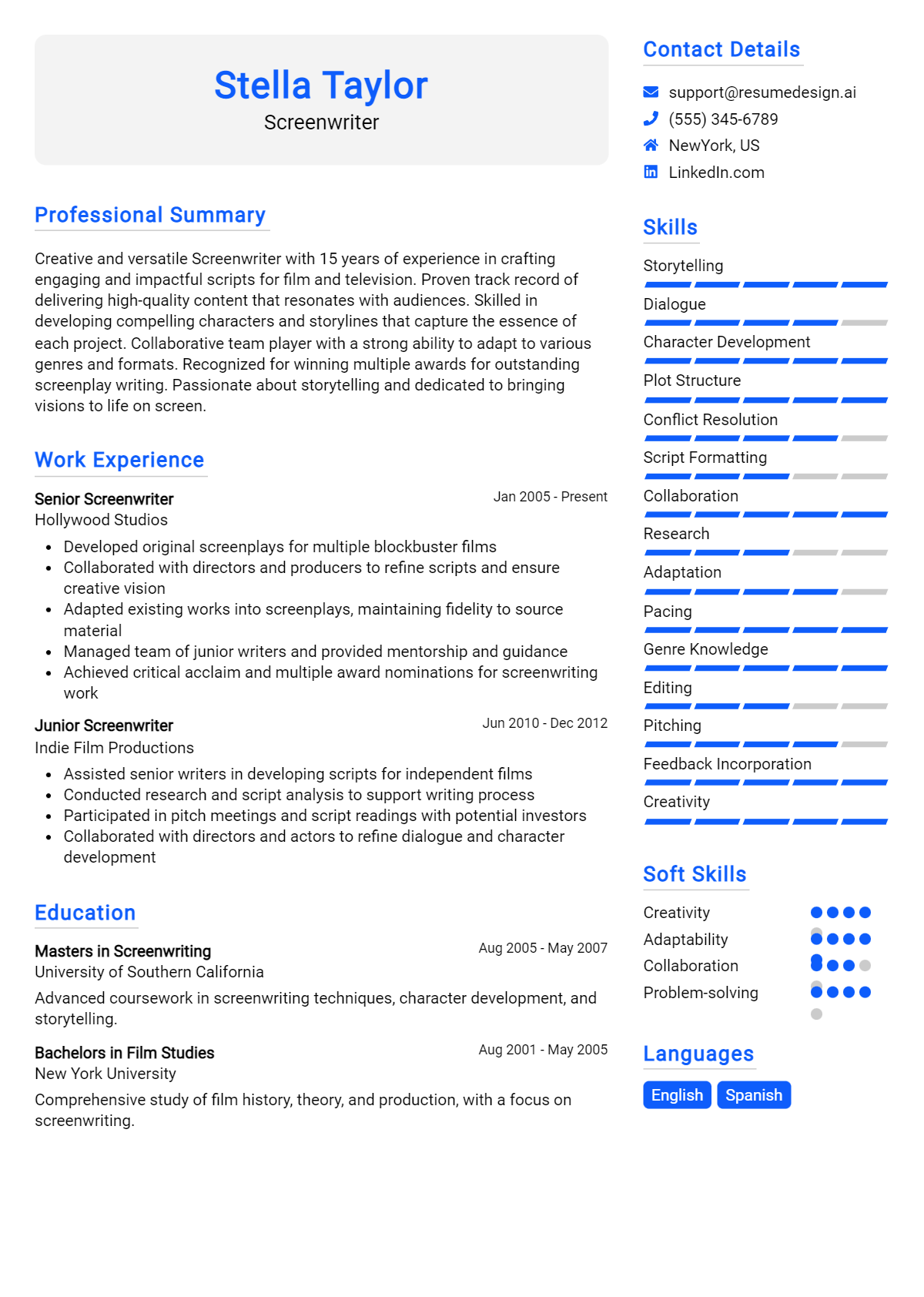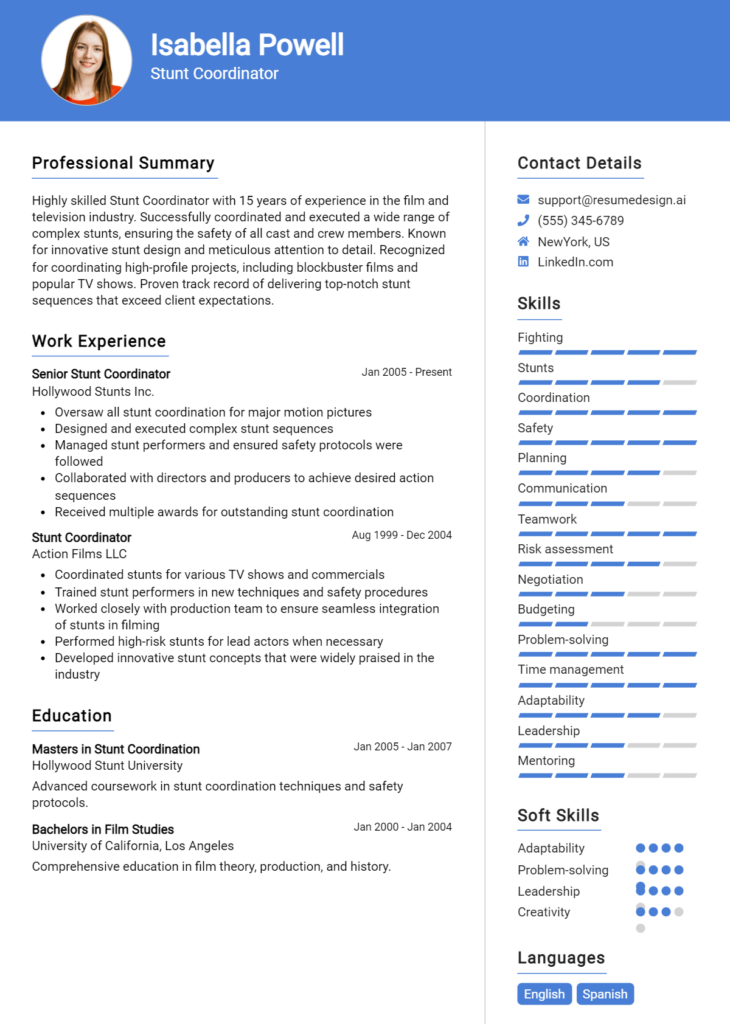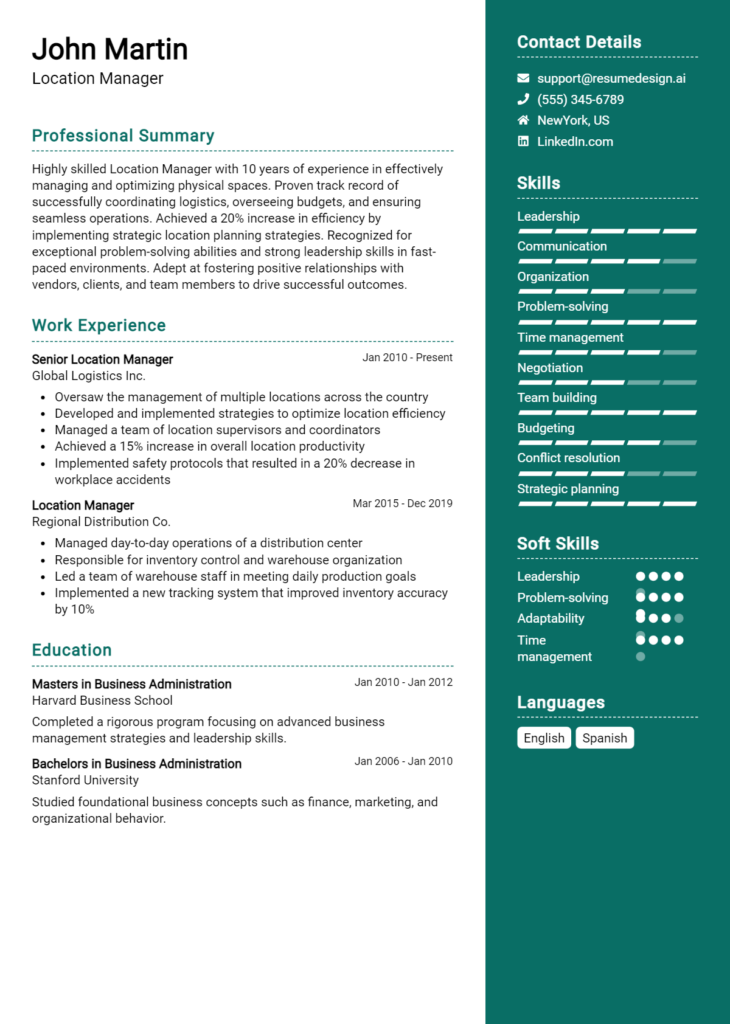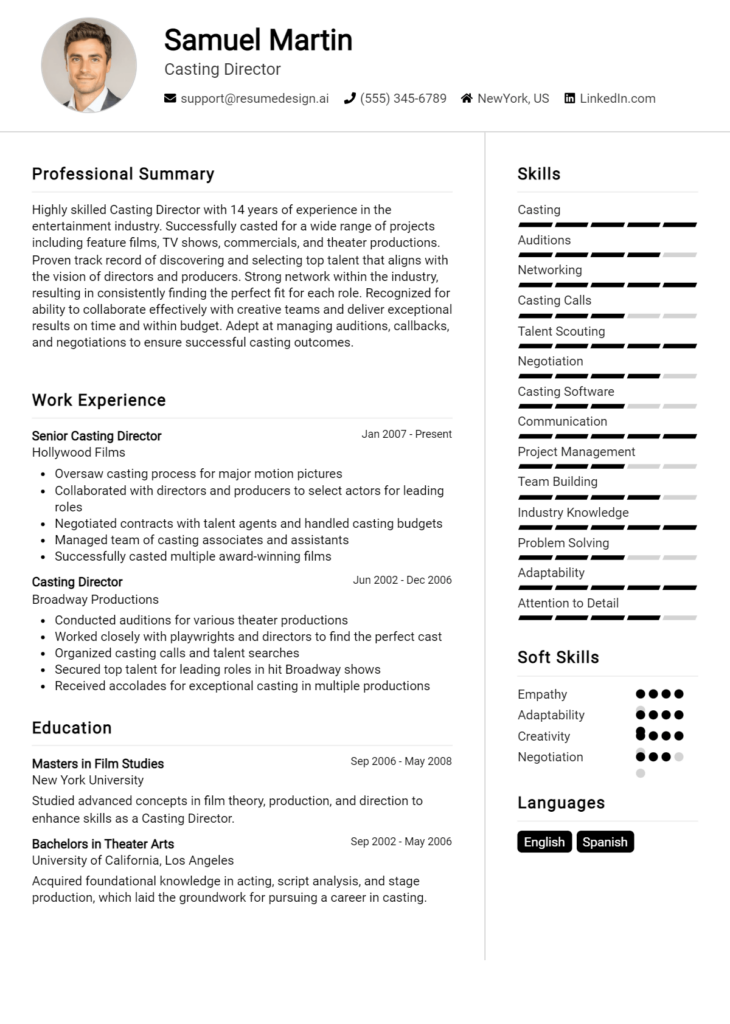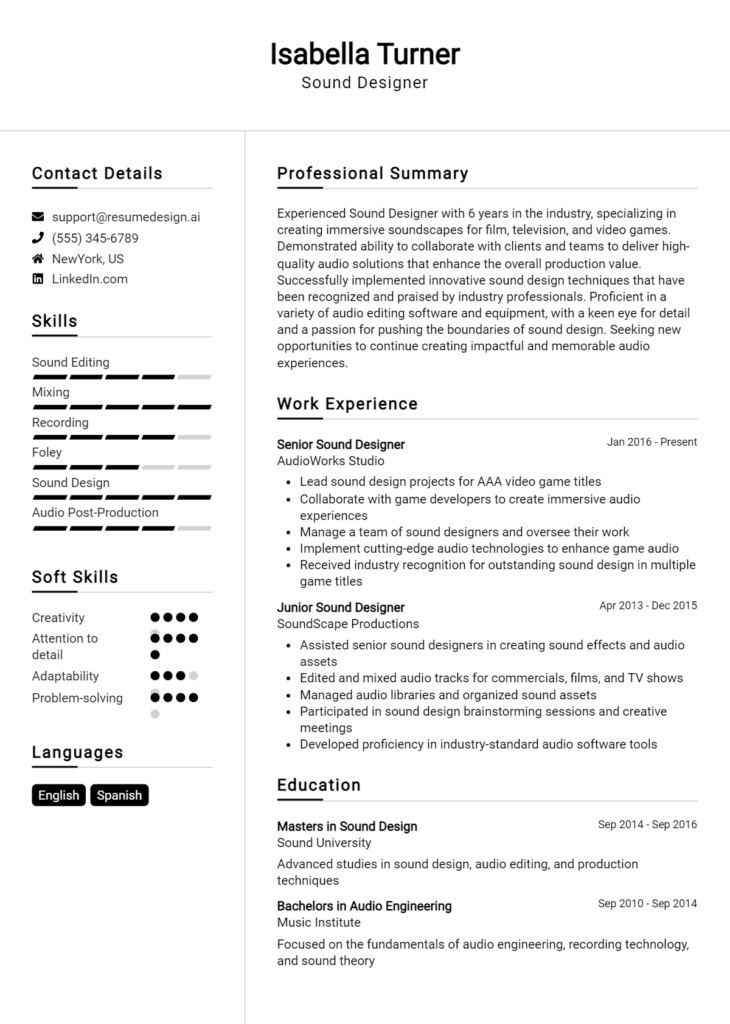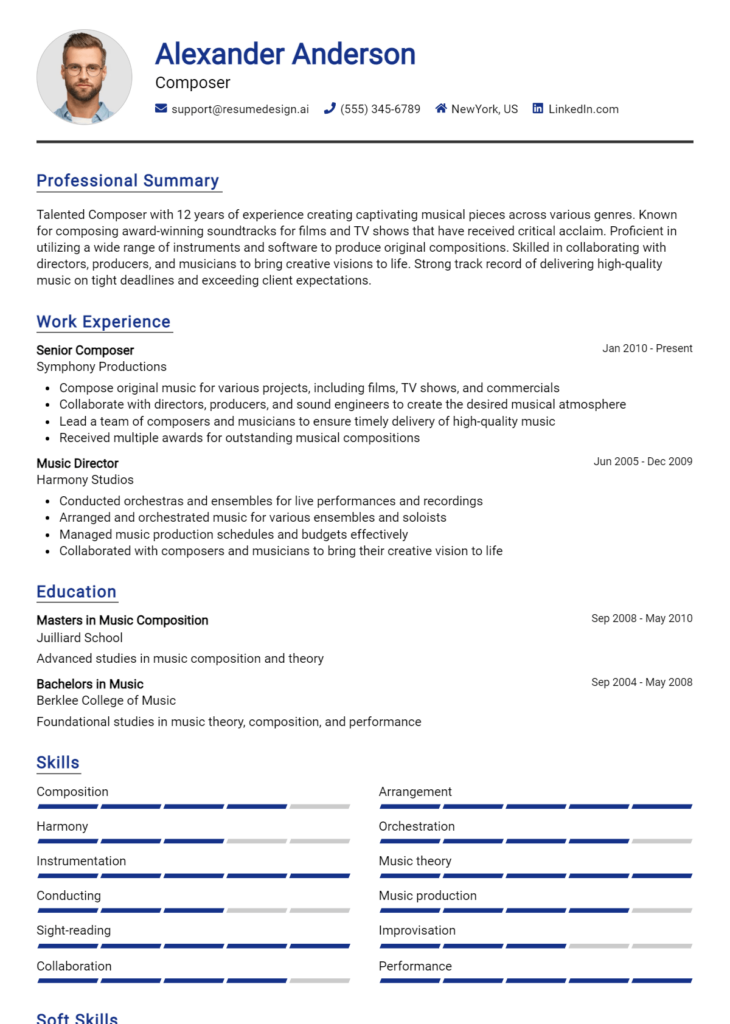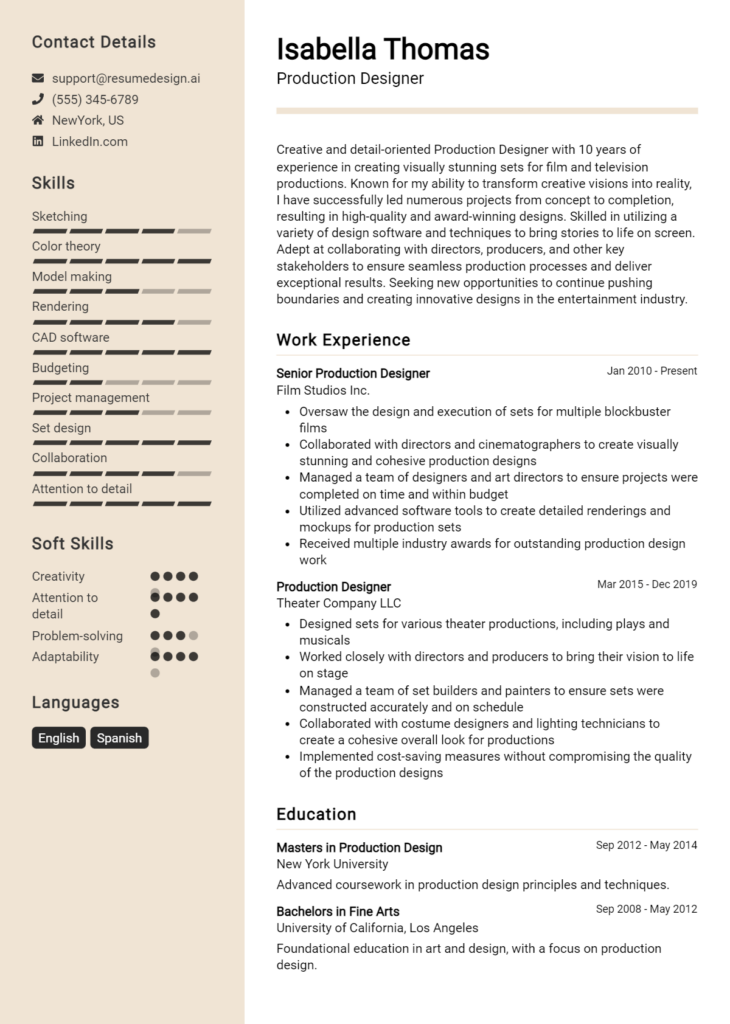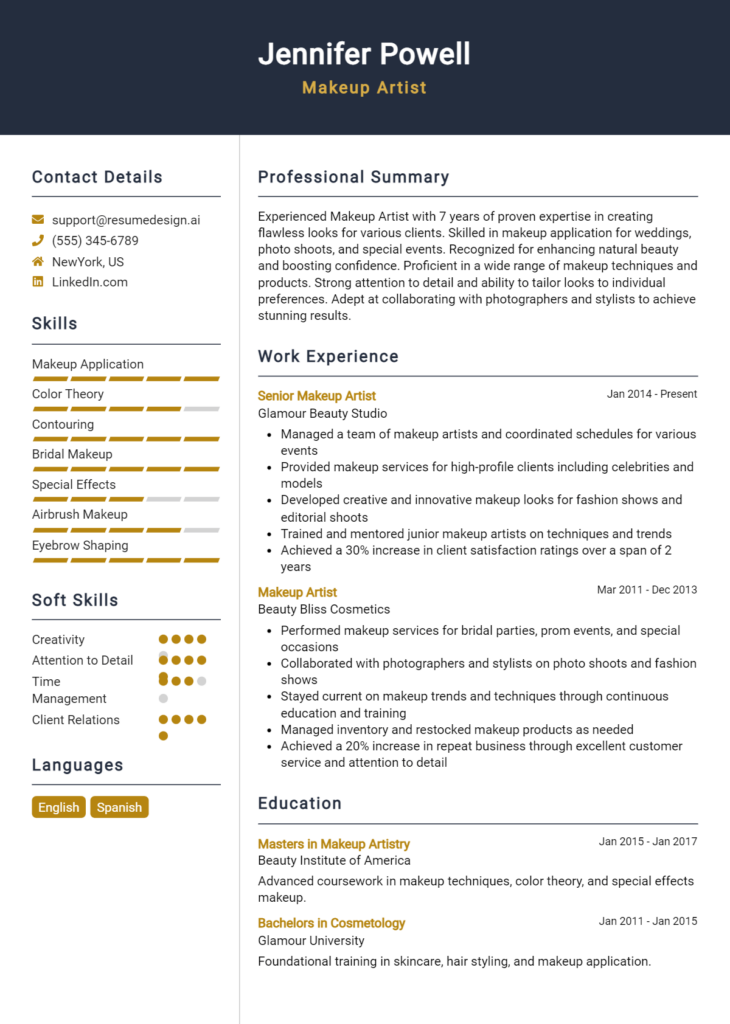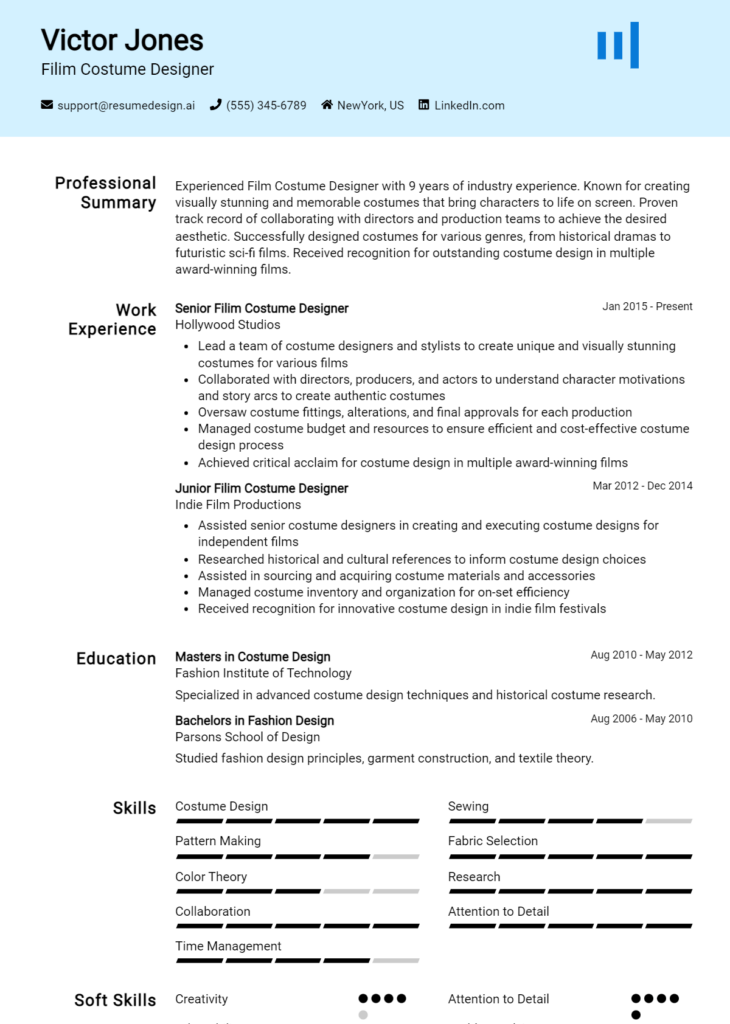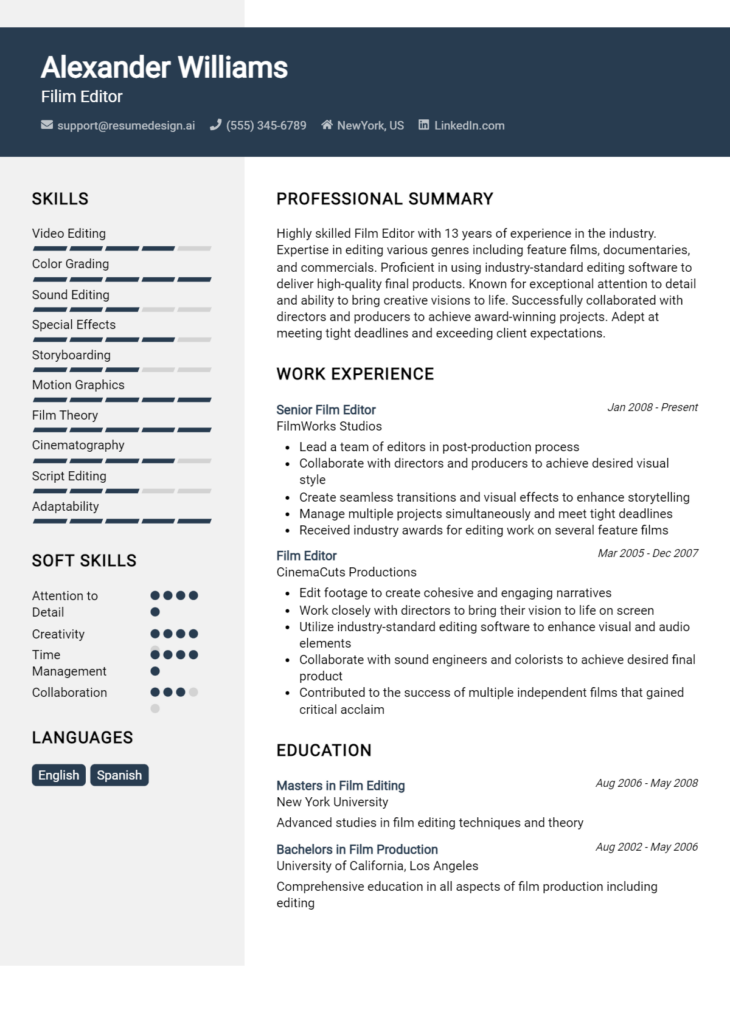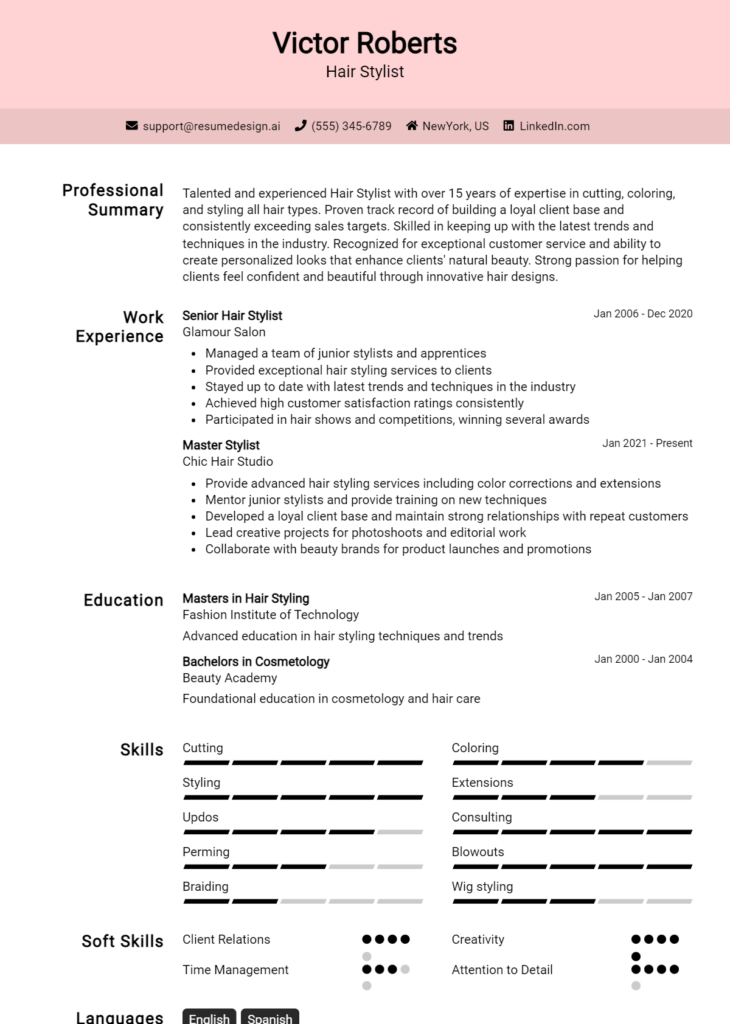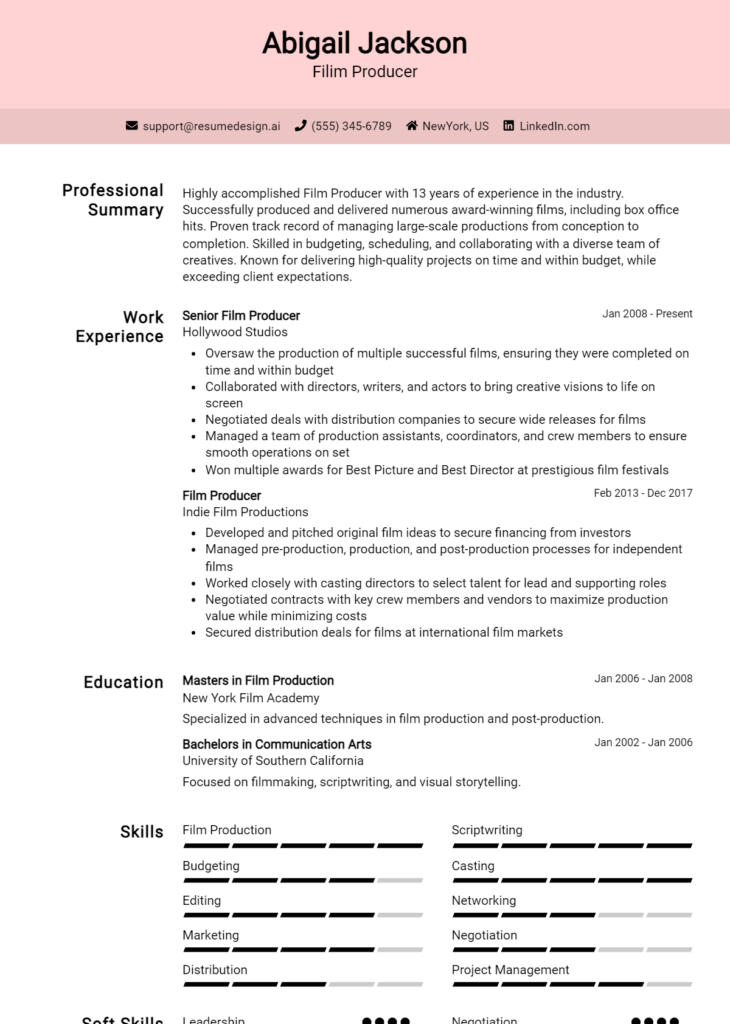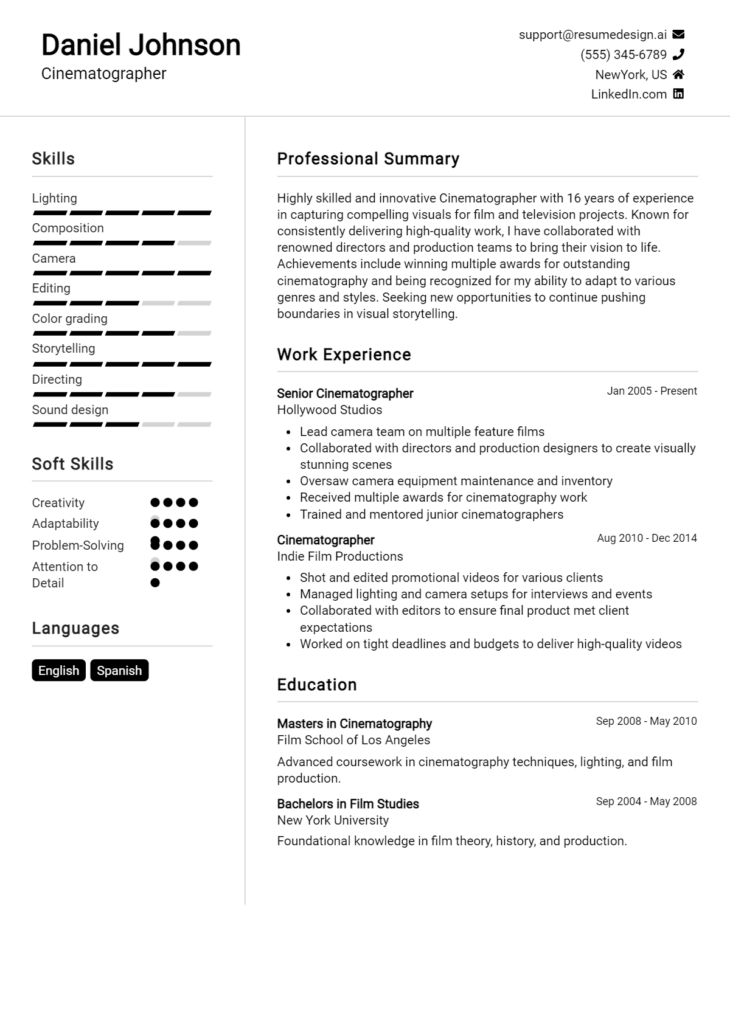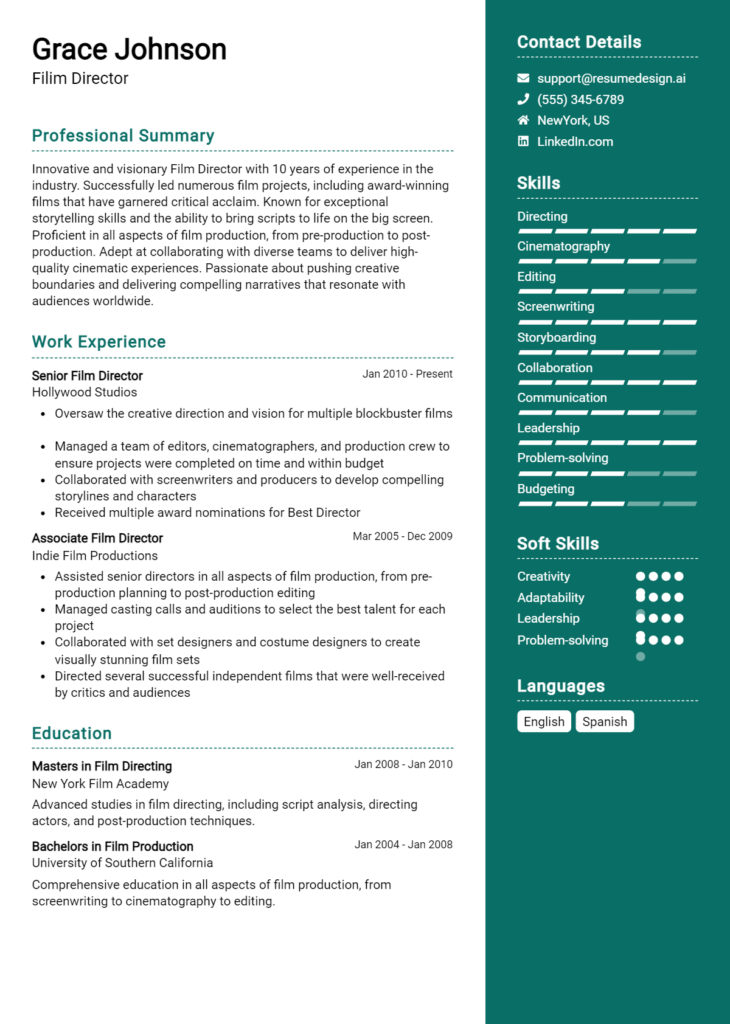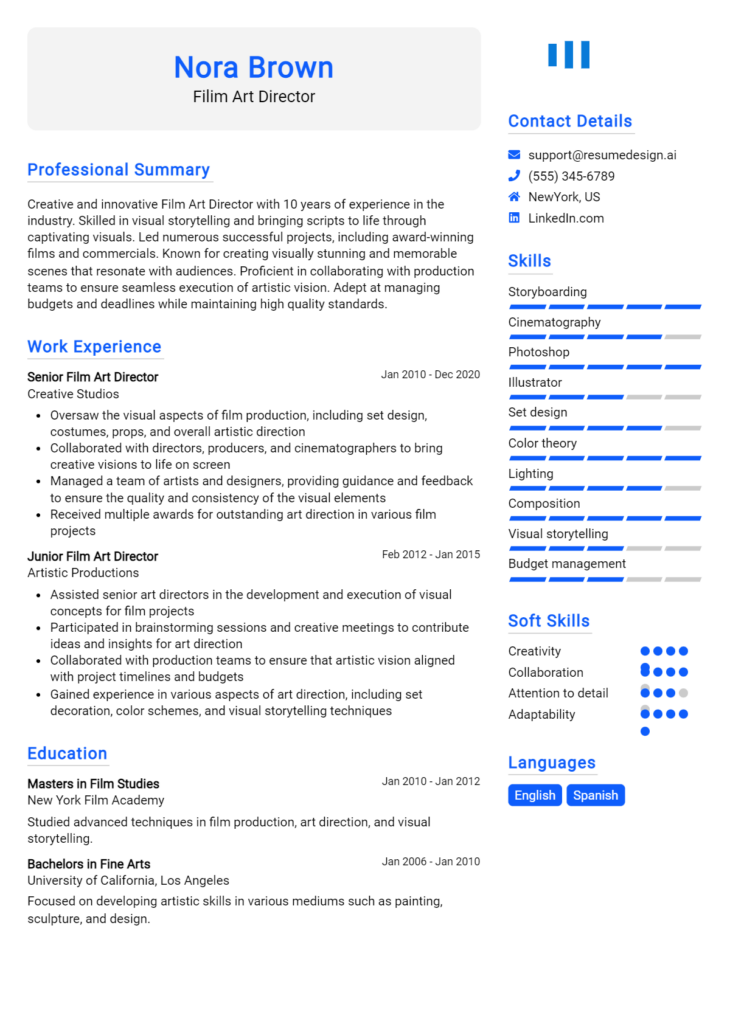Screenwriter Core Responsibilities
A Screenwriter is responsible for crafting compelling narratives and dialogue that resonate with audiences and drive the storyline forward. This role requires strong technical writing skills, creativity, and the ability to collaborate effectively with directors, producers, and other team members. Screenwriters must possess problem-solving abilities to navigate creative challenges and adapt scripts based on feedback. A well-structured resume highlighting these competencies can significantly enhance a candidate's appeal and contribute to the organization's storytelling goals.
Common Responsibilities Listed on Screenwriter Resume
- Develop and write original screenplays for film and television.
- Research and analyze themes, characters, and settings to enhance storytelling.
- Collaborate with directors and producers to refine scripts and adjust storylines.
- Edit and revise scripts based on feedback from stakeholders.
- Attend script readings and workshops to gather insights and improve drafts.
- Pitch ideas and concepts to production teams and executives.
- Maintain knowledge of industry trends and audience preferences.
- Ensure scripts adhere to production budgets and timelines.
- Create character profiles and detailed outlines for story development.
- Contribute to brainstorming sessions and collaborative writing processes.
- Utilize screenwriting software to format scripts professionally.
High-Level Resume Tips for Screenwriter Professionals
In the competitive world of screenwriting, a well-crafted resume is more than just a list of past experiences; it’s often the first impression a candidate makes on a potential employer. A strong resume should not only showcase your writing prowess but also reflect your unique skills and achievements that set you apart from the competition. Given the nuances of the film and television industry, it’s essential to present a polished document that effectively communicates your creativity and professionalism. This guide will provide practical and actionable resume tips specifically tailored for Screenwriter professionals, helping you craft a compelling narrative that resonates with hiring managers.
Top Resume Tips for Screenwriter Professionals
- Tailor your resume to each job description, emphasizing the skills and experiences that align closely with the specific project or role.
- Showcase relevant experience by including any produced scripts, collaborations, or notable projects that demonstrate your writing capabilities.
- Quantify achievements where possible, such as mentioning awards, nominations, viewership numbers, or critical acclaim your work has received.
- Highlight industry-specific skills, such as knowledge of screenplay formatting, story structure, character development, and genre conventions.
- Include a strong summary statement at the top of your resume that encapsulates your unique voice and writing style.
- Utilize a clean and professional layout that enhances readability; consider incorporating industry-standard fonts and clear headings.
- List relevant education and training, particularly if you have completed screenwriting courses, workshops, or attended film schools.
- Incorporate keywords from the job posting to help your resume pass through applicant tracking systems and catch the attention of hiring managers.
- Consider adding a section for additional skills, such as familiarity with screenplay software (like Final Draft) or experience in related areas like directing or producing.
- Keep your resume concise, ideally one page, focusing on the most impactful information that reflects your strengths as a screenwriter.
By implementing these tips, you can significantly increase your chances of landing a job in the screenwriting field. A tailored and polished resume will not only highlight your skills and experiences but also convey your passion and dedication to the craft, making a lasting impression on potential employers.
Why Resume Headlines & Titles are Important for Screenwriter
In the competitive realm of screenwriting, where creativity meets precision, a strong resume headline or title is crucial for standing out to hiring managers. This succinct phrase serves as a powerful first impression, summarizing a candidate’s key qualifications and unique selling points in just a few words. An effective headline not only grabs attention but also reinforces the applicant's relevance to the position, making it essential to be concise, relevant, and directly tied to the job being applied for. A compelling headline can set the tone for the rest of the resume, enticing hiring managers to delve deeper into the candidate’s experience and skills.
Best Practices for Crafting Resume Headlines for Screenwriter
- Keep it concise and clear; aim for one impactful sentence.
- Make it relevant to the specific position you are applying for.
- Incorporate strong action words to convey energy and expertise.
- Highlight key skills or experiences that align with the job description.
- Avoid jargon and vague phrases; be specific about your strengths.
- Consider including years of experience or notable achievements.
- Use a professional tone that reflects your unique voice as a writer.
- Tailor your headline for each application to emphasize the most relevant qualifications.
Example Resume Headlines for Screenwriter
Strong Resume Headlines
Award-Winning Screenwriter with 10+ Years of Experience in Feature Films
Creative Storyteller Specializing in Character-Driven Narratives and Dialogue
Experienced Screenwriter with Proven Track Record in Developing Compelling Scripts for Television
Weak Resume Headlines
Screenwriter Looking for Opportunities
Writer with Some Experience
The strong headlines are effective because they immediately convey the candidate's expertise and accomplishments while drawing a direct connection to the job at hand. They use specific language that highlights experience and skills relevant to the screenwriting field, making them memorable and enticing for hiring managers. In contrast, the weak headlines lack specificity and fail to demonstrate the candidate's unique qualifications, resulting in a generic impression that does not capture the attention of potential employers. By avoiding vague phrases and emphasizing clear strengths, candidates can significantly enhance their chances of making a lasting impact.
Writing an Exceptional Screenwriter Resume Summary
A well-crafted resume summary is crucial for a Screenwriter as it serves as the first impression for hiring managers, offering a snapshot of the candidate's skills, experience, and achievements. A strong summary should be concise and impactful, quickly capturing attention and compelling the reader to delve deeper into the resume. It should highlight relevant writing experience, showcase key skills in storytelling and character development, and present notable accomplishments. Tailoring the summary to the specific job application not only demonstrates the candidate’s suitability but also reveals their understanding of the industry and the position’s requirements.
Best Practices for Writing a Screenwriter Resume Summary
- Quantify Achievements: Use numbers to demonstrate success, such as box office returns or awards won.
- Focus on Relevant Skills: Highlight skills specific to screenplay writing, such as dialogue crafting and character arcs.
- Tailor to the Job Description: Adjust your summary to align with the specific requirements and keywords in the job listing.
- Use Strong Action Verbs: Begin with powerful verbs that convey confidence and capability, such as "developed," "created," or "produced."
- Highlight Unique Selling Points: Identify what sets you apart from other candidates, whether it’s a unique style or a diverse portfolio.
- Keep It Concise: Aim for 2-4 sentences that effectively summarize your strengths without overwhelming the reader.
- Incorporate Industry Terminology: Use relevant jargon to demonstrate your familiarity with the industry and its standards.
- Review and Edit: Proofread your summary for clarity and impact; a polished summary reflects professionalism.
Example Screenwriter Resume Summaries
Strong Resume Summaries
Creative Screenwriter with over 8 years of experience in film and television, achieving 3 feature film productions that garnered over $10 million at the box office. Recognized for crafting compelling narratives and authentic dialogue, resulting in a 98% positive review rating from critics.
Award-winning Screenwriter with a proven track record in developing original content for streaming platforms, including a series that reached 1 million views in its first month. Adept at collaborating with directors and producers to create engaging storylines that resonate with audiences.
Dynamic Screenwriter specializing in science fiction and fantasy genres, with 5 produced short films and a recent feature film selected for three international film festivals. Expert in character development and world-building, leading to an average audience score of 85%.
Weak Resume Summaries
Screenwriter with some experience in writing for various media. I have worked on different projects and have a passion for storytelling.
A talented writer who enjoys creating scripts and has worked on a few films and TV shows. Looking for opportunities to expand my career in screenwriting.
The strong resume summaries are considered effective because they provide specific achievements and metrics that showcase the candidate's impact, while also highlighting relevant skills and experiences tailored to the role. In contrast, the weak resume summaries are vague and lack quantifiable outcomes, failing to convey the candidate's unique strengths or suitability for the position, making them less compelling to hiring managers.
Work Experience Section for Screenwriter Resume
The work experience section of a screenwriter's resume is vital for demonstrating the candidate's technical skills, leadership capabilities, and the ability to deliver high-quality products in a competitive industry. This section not only highlights the specific projects a screenwriter has contributed to but also reflects their proficiency in crafting engaging narratives, managing creative teams, and adhering to industry standards. By quantifying achievements and aligning experiences with industry benchmarks, screenwriters can effectively illustrate their value to potential employers and collaborators, ensuring they stand out in a crowded job market.
Best Practices for Screenwriter Work Experience
- Highlight specific technical skills related to screenwriting, such as formatting, structure, and genre expertise.
- Quantify results where possible, such as box office revenue, audience ratings, or number of awards received.
- Demonstrate collaboration by mentioning teamwork with directors, producers, and other writers.
- Include relevant keywords from job postings to align your experience with industry standards.
- Use action verbs to convey a sense of proactive contribution and leadership.
- Focus on presenting completed projects that have had a measurable impact on the audience or market.
- Showcase any mentorship or training roles that illustrate your ability to lead and develop talent.
- Tailor your work experiences to reflect the specific requirements of the job you are applying for.
Example Work Experiences for Screenwriter
Strong Experiences
- Wrote and co-produced a feature film that grossed over $5 million at the box office, receiving critical acclaim and two festival awards.
- Led a team of five writers to develop a television pilot that was picked up by a major network, resulting in a series order for two seasons.
- Collaborated with a renowned director on a short film that won Best Short Film at the XYZ Film Festival, showcasing strong narrative development and character arcs.
- Mentored junior writers in script formatting and development, leading to two of them securing their first screenwriting credits.
Weak Experiences
- Worked on various scripts for different projects.
- Assisted in the writing process for an unnamed film.
- Contributed to a writing team but did not specify any outcomes or successes.
- Participated in brainstorming sessions for a TV show.
The examples of strong experiences are considered effective because they provide concrete details about achievements, such as financial success and award recognition, that clearly demonstrate the candidate's impact on projects. They also highlight leadership and mentorship roles, showcasing both technical expertise and collaboration. In contrast, the weak experiences lack specificity and measurable outcomes, making it difficult for potential employers to assess the candidate's contributions or skills. These vague statements do not effectively communicate the value the candidate can bring to a new project or team.
Education and Certifications Section for Screenwriter Resume
The education and certifications section of a Screenwriter resume is crucial in establishing a candidate's academic background and professional credentials. It highlights the formal training and specialized knowledge that a screenwriter possesses, demonstrating their commitment to the craft and ongoing learning. This section can include relevant coursework, industry-recognized certifications, and any specialized training that showcases the candidate's skills and dedication to screenwriting. By providing this information, candidates can significantly enhance their credibility and align themselves more closely with the expectations of potential employers in the film and television industry.
Best Practices for Screenwriter Education and Certifications
- Focus on relevance: Include only degrees and certifications that directly relate to screenwriting or the film industry.
- Detail your coursework: Highlight specific courses that pertain to screenwriting, storytelling, or related fields.
- Highlight advanced degrees: If you have a Master's or higher, make sure to emphasize these accomplishments.
- Include industry-recognized certifications: If you have credentials from reputable institutions, list them prominently.
- Showcase continuous learning: Mention workshops, seminars, or online courses that demonstrate your commitment to improving your craft.
- Emphasize practical training: Highlight any hands-on experiences, such as internships or projects, that relate to screenwriting.
- Use clear formatting: Make your education and certifications easy to read with a clean layout and consistent style.
- Keep it concise: Limit this section to the most impactful information to maintain the reader's interest.
Example Education and Certifications for Screenwriter
Strong Examples
- Bachelor of Fine Arts in Screenwriting, University of California, Los Angeles (UCLA), 2020
- Certificate in Advanced Screenwriting, The American Film Institute (AFI), 2021
- Coursework in Narrative Structure and Character Development, Columbia University, 2019
- Participant in the Screenwriting Lab, Sundance Institute, 2022
Weak Examples
- Associate Degree in General Studies, Local Community College, 2015
- Certification in Basic Computer Skills, Online Academy, 2020
- High School Diploma, Central High School, 2013
- Workshop in Creative Writing, Unspecified Location, 2018
The examples above illustrate the distinction between strong and weak qualifications. Strong examples are directly relevant to the field of screenwriting and demonstrate a focused academic background and industry engagement. They reflect a commitment to the craft through specialized training and participation in notable programs. In contrast, the weak examples include irrelevant qualifications that do not contribute to a screenwriter's credibility or skill set, such as general studies or unrelated certifications, which could detract from the overall professionalism of the resume.
Top Skills & Keywords for Screenwriter Resume
In the competitive world of screenwriting, showcasing the right skills on your resume is essential for capturing the attention of agents, producers, and studios. A well-crafted resume not only highlights your creative abilities but also underscores your technical proficiency and adaptability in a fast-paced industry. By effectively communicating both your soft and hard skills, you can demonstrate your comprehensive understanding of story structure, character development, and industry standards, ultimately positioning yourself as a compelling candidate. For aspiring screenwriters, emphasizing these skills can significantly enhance their chances of landing that coveted opportunity in the film and television landscape.
Top Hard & Soft Skills for Screenwriter
Soft Skills
- Creativity
- Collaboration
- Adaptability
- Communication
- Time Management
- Critical Thinking
- Emotional Intelligence
- Attention to Detail
- Problem-Solving
- Networking Skills
- Perseverance
- Open-mindedness
- Storytelling Ability
- Listening Skills
Hard Skills
- Script Formatting
- Screenplay Structure
- Character Development
- Dialogue Writing
- Genre Awareness
- Research Skills
- Editing and Revising
- Knowledge of Screenwriting Software (e.g., Final Draft, Celtx)
- Understanding of Film Production Processes
- Ability to Write for Different Media (film, TV, web)
- Creating Treatment and Pitch Documents
- Storyboarding
- Knowledge of Copyright Laws
- Familiarity with Industry Trends and Audience Preferences
By focusing on these essential skills and developing a strong work experience section, screenwriters can create a resume that stands out in a crowded field.
Stand Out with a Winning Screenwriter Cover Letter
Dear [Hiring Manager's Name],
I am writing to express my interest in the Screenwriter position at [Company Name], as advertised on [Job Board/Website]. With a passion for storytelling and a solid background in scriptwriting, I believe I am well-equipped to contribute to your team. My experience spans various genres, including drama, comedy, and thriller, allowing me to adapt my writing style to fit diverse narratives and audiences. I am particularly drawn to [Company Name] because of its innovative approach to filmmaking and commitment to producing compelling, character-driven stories.
Throughout my career, I have honed my skills in crafting engaging screenplays that resonate with viewers. My most recent project, [Project Title], was selected for [Film Festival/Competition], where it received [Award/Recognition]. This experience taught me the importance of collaboration and feedback in the creative process, as I worked closely with directors and producers to refine the script and ensure it aligned with the overall vision of the film. I thrive in dynamic environments where creativity and teamwork intersect, and I am eager to bring that collaborative spirit to [Company Name].
In addition to my screenwriting skills, my background in [Related Field, e.g., film studies, theater, etc.] has equipped me with a comprehensive understanding of narrative structure and character development. I am proficient in industry-standard software, such as Final Draft and Celtx, and I keep abreast of emerging trends in screenwriting and storytelling techniques. I am excited about the prospect of contributing to [Company Name]'s future projects and helping to create memorable stories that captivate audiences around the world.
Thank you for considering my application. I look forward to the opportunity to discuss how my skills and experiences align with the goals of [Company Name]. I am enthusiastic about the possibility of working together to create impactful and entertaining films.
Warm regards,
[Your Name]
[Your Phone Number]
[Your Email Address]
[Your LinkedIn Profile or Personal Website]
Common Mistakes to Avoid in a Screenwriter Resume
When applying for a screenwriting position, your resume serves as a critical first impression that showcases your skills, experience, and creativity. However, many screenwriters make common mistakes that can hinder their chances of landing that coveted opportunity. Understanding these pitfalls can help you craft a compelling resume that highlights your unique talents and fits the industry’s expectations. Below are some frequent mistakes to avoid when creating your screenwriter resume:
Lack of a Clear Format: A cluttered or overly complex layout can distract from your content. Stick to a clean, professional format that makes it easy for hiring managers to scan your information.
Excessive Length: Screenwriter resumes should typically be one page long. Being concise helps you focus on the most relevant experiences and keeps the reader's attention.
Generic Objective Statement: Avoid using a vague objective that could apply to any job. Instead, tailor your statement to reflect your passion for screenwriting and the specific role you're applying for.
Not Highlighting Relevant Experience: Screenwriters often have diverse backgrounds. Make sure to emphasize experiences that relate directly to screenwriting, such as writing credits, produced scripts, or relevant film school projects.
Neglecting to Showcase Skills: Failing to list key skills such as genre expertise, collaboration, or software proficiency can make you seem less qualified. Be sure to include skills that are pertinent to the screenwriting process.
Ignoring Formatting Consistency: Inconsistencies in font sizes, bullet points, and alignment can give off an unprofessional vibe. Maintain uniformity throughout your resume to reflect attention to detail.
Overlooking Networking Opportunities: Failing to mention collaborations or connections within the industry can be a missed opportunity. Including notable partnerships can help establish credibility.
Forgetting to Include Contact Information: It may seem basic, but forgetting to provide clear contact details can result in missed opportunities. Ensure your email and phone number are easy to find and up to date.
Conclusion
As we delve into the essential components of a successful Screenwriter resume, it's clear that a well-structured and compelling presentation of your skills and experiences can significantly enhance your chances of landing that coveted role in the film and television industry.
Key points to consider include the importance of tailoring your resume to highlight relevant experiences, showcasing your unique voice and style, and including specific examples of your work, such as produced scripts or notable projects. Moreover, emphasizing collaboration with directors and producers can demonstrate your ability to work within a team, which is crucial in the screenwriting field.
In conclusion, we encourage you to take a moment to review and refine your Screenwriter resume. This is your opportunity to make a strong impression and convey your passion for storytelling. To assist you in this process, consider utilizing a variety of helpful resources. Explore resume templates to find a design that resonates with your creative style, or try out the resume builder for a straightforward way to construct your resume. Additionally, you can draw inspiration from resume examples tailored for screenwriters, and don’t forget to pair your resume with an impactful introduction by using our cover letter templates. Take action today to elevate your resume and step closer to achieving your screenwriting dreams!

